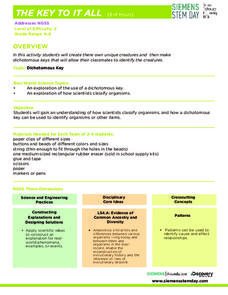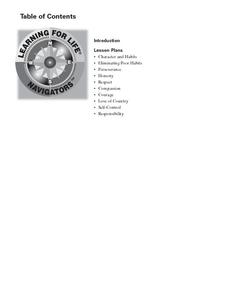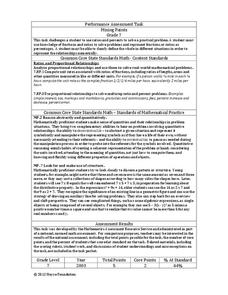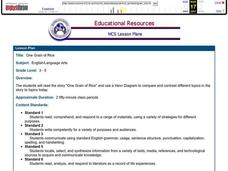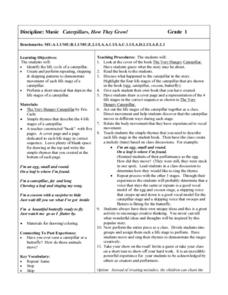Discovery Education
The Key to It All
Which characteristics make organisms unique? Dichotomous keys simplify the process of classifying organisms by focusing on these unique characteristics. Young scholars learn how to use the dichotomous key flow chart by creating their own...
Learning for Life
Character and Habits
Part of growing up is differentiating between good and bad habits; developing the positive and eliminating the negative. This resource on life skills can be adapted to almost any age group. Class members participate in multiple...
Curated OER
Clay Wipe Away: Ceramics
Discuss Pre-Colombian South American art with your class, then get out the clay and create some. Pupils practice using the wipe-away technique to create a ceramic tile similar to those made by the Maya. Great web links and a...
Curated OER
Jewish Folk Song: Ya Ba Bom
Singing is a wonderful way to express an idea of any kind. This lesson is written expressly for use in directing a high school chorus. They work on using four-part harmony, expression, and melodic intervals while singing a Jewish folk...
Curated OER
Exploring the Sky: Reading Maria's Comet
Discover the science behind astronomy. After reading the book Maria's Comet, which is about a young woman who breaks new ground by becoming a female astronomer, young learners practice reading comprehension with worksheet questions about...
Curated OER
Biopoem Strategy as Part of a Character Analysis for Of Mice and Men
Readers of John Steinbeck’s Of Mice and Men will learn much “more than what (is) said to them” as they use the biopoem format and craft a poem about one of the major characters in Steinbeck’s tragic story of Geroge Milton and Lennie...
Curated OER
Setting Details in Of Mice and Men
After completing John Steinbeck’s Of Mice and Men, groups are assigned a chapter to reread. Members list major conflicts and events and quote setting details. They then make observations about how the setting prepares the reader for the...
Sargent Art
Rainsticks
This rainstick instructional activity isn't just about making art; it's about understanding Native American symbols and culture. Kids read about the use of rainsticks and why specific symbols were used to decorate them. They then make...
Denton Independent School District
Pieces to the Puzzle Fraction Project
Four polygons each have a fraction with unlike denominators printed on them. Creative math minds select several shapes to create a design with and then write and solve a math problem involving the addition of all of the fractions...
Ohio Resource Center
Clouds
Get your little readers moving with a fun lesson about Eric Carle's Little Cloud. After reading the book together, they engage in a series of locomotor and manipulative activities to illustrate how different elements of the story would...
EngageNY
Analyzing a Data Set
Through discussions and journaling, classmates determine methods to associate types of functions with data presented in a table. Small groups then work with examples and exercises to refine their methods and find functions that work to...
Noyce Foundation
Mixing Paints
Let's paint the town equal parts yellow and violet, or simply brown. Pupils calculate the amount of blue and red paint needed to make six quarts of brown paint. Individuals then explain how they determined the percentage of the brown...
Noyce Foundation
Boxes
Teach your class to think outside the box. Scholars use the concept of equality to solve a problem in the assessment task. They determine how to use a scale to identify the one box out of a set of nine boxes that is heavier than the others.
New South Wales Department of Education
Plant Features
Pine needles are actually modified leaves. In the 16th installment of 20, young scientists explore plants. Through an analysis of leaves — shape, veins, and edges — pupils see how to classify plants based on structural features.
NOAA
A Quest for Anomalies
Sometimes scientists learn more from unexpected findings than from routine analysis! Junior oceanographers dive deep to explore hydrothermal vent communities in the fourth lesson in a series of five. Scholars examine data and look for...
Curated OER
One Grain of Rice
Upper graders read the story One Grain of Rice, and use a Venn diagram to compare and contrast topics found in the story to current event topics today. Groups of three learners work together to create their diagram. The topics they must...
Curated OER
"Name Those Vowels"
Help your class recognize the capital and lower-case forms of the five vowels. They will learn how to make capital and lower-case forms of the vowels and all the rules surrounding vowels. Fun songs and activities are included. Links to...
Curated OER
3-2-1 Pop!
Students investigate how rocket liftoff demonstrates Newton's Laws of Motion. They participate in a class discussion, and construct a rocket powered by the pressure generated from an antacid tablet reacting with water.
Curated OER
Alleluia
Singers practice perfecting the song, Alleluia. They focus on singing techniques, style, phrasing, and working with syncopation. This lesson is a microteahing lesson and includes a warm up and vocal exercises.
Curated OER
Math Can Be Electrifying
Students explore how math can be used to calculate and analyze how electricity causes air pollution. Students design a campaign to educate family members on ways they can save electricity. They create a graph that compares two electric...
Curated OER
Music: Caterpillars, How They Grow!
Put on some music and get moving as a way to represent the life cycle of a caterpillar. Kids listen to the story The Very Hungary Caterpillar, discuss the life cycle, then create vocal expression that represent each stage of the cycle....
Curated OER
Explore Subtraction
Learnersare given 26 tables and graphs in which they must fill in missing numbers and graph equations. They subtract a given value of x from a constant number, and use a number line to subtract larger numbers from smaller ones resulting...
Curated OER
The Art and Science of Impressionist Color
Discover Impressionist painting as students investigate the 19th century combinations of colors characteristically used. Students experiment with their own paintings, utilizing primary and secondary colors.
Curated OER
Maximum/ Minimum Problems
In this optimization worksheet, students solve 20 short answer word problems. Students read, sketch, define variables, write equations, differentiate their equations, and find the maximum or minimum of each word problem.


